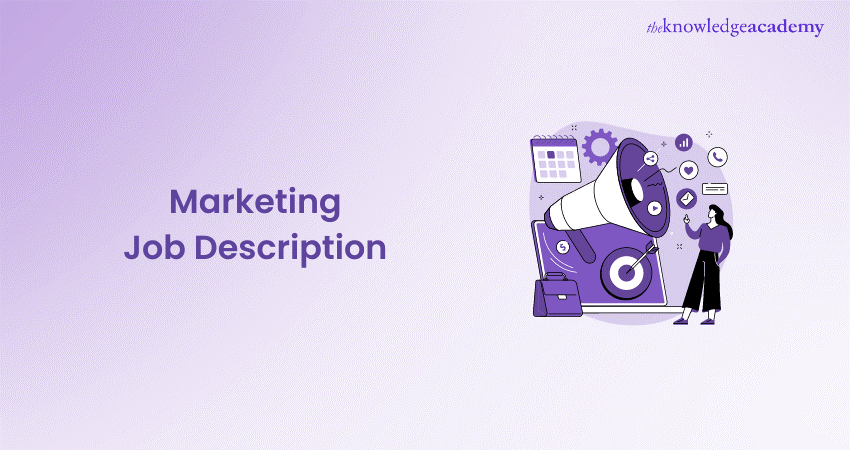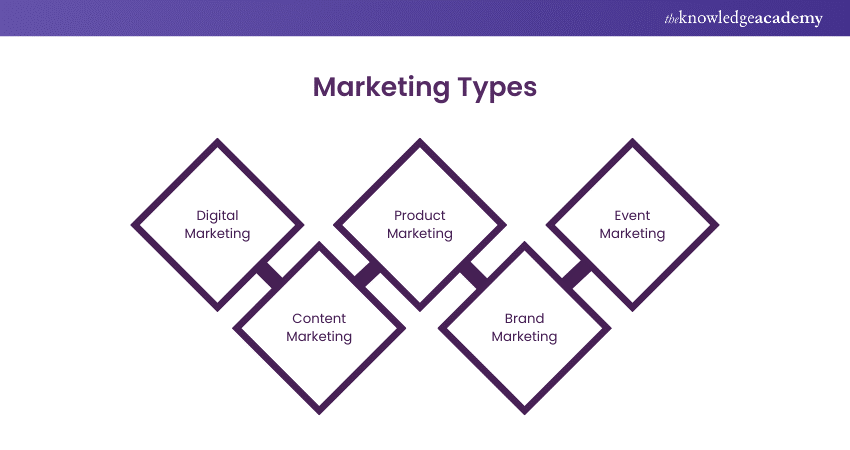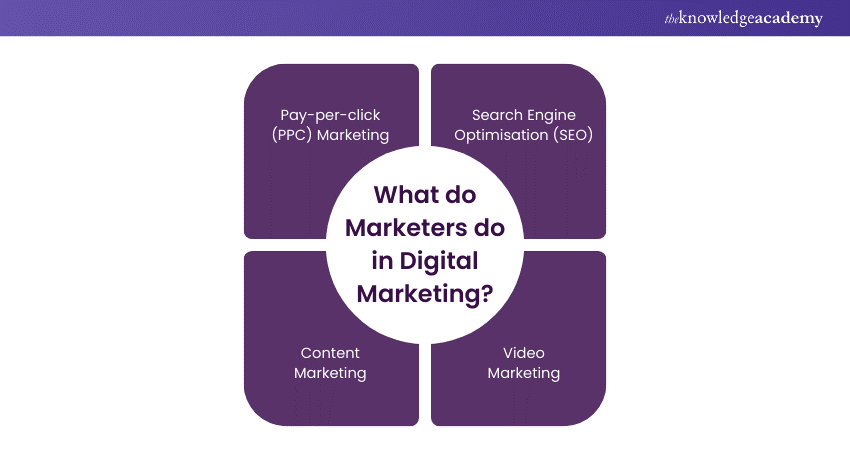We may not have the course you’re looking for. If you enquire or give us a call on +91-181-5047001 and speak to our training experts, we may still be able to help with your training requirements.
Training Outcomes Within Your Budget!
We ensure quality, budget-alignment, and timely delivery by our expert instructors.

Interested in a marketing career? You’ve hit the jackpot! Dive into this blog on Marketing Job Descriptions and discover the wizards behind business growth. They’re the brains crafting strategies, stirring up campaigns, and wielding social media and ads to captivate the perfect crowd.
These experts analyse market trends, create campaigns, and use tools like social media and advertising to reach the right audience. Their goals are to understand customer needs, build brand awareness, generate demand, and foster loyalty. Continue reading this blog on Marketing Job Description to understand more about this job role.
Table of Contents
1) What is Marketing?
2) Marketing job requirements and qualifications
3) Marketing job responsibilities
4) Marketing job skills
5) Types of Marketing
6) What do Marketers do in Digital Marketing?
7) What do Marketers do in Traditional Marketing?
8) How to become a Marketer?
9) Marketing Job Description templates
10) Conclusion
What is Marketing?
For small businesses, drawing in customers is essential, and Marketing serves as the key tool for this purpose. Marketing involves crafting and conveying the value of your products or services. It encompasses a strategy designed to convert potential buyers into content and loyal customers, covering a spectrum from market analysis to promotional activities. The ultimate aim of Marketing is to persuade consumers of the value of your offerings, fostering brand allegiance and boosting revenue.
This task is far from simple. Marketers must invest time in understanding their target audience, which aids in identifying the most impactful marketing strategies to stand out in the saturated marketplace of promotional tactics.
Marketing and promotion experts focus on capturing the interest of crucial demographic segments through advertising efforts. These promotions are carefully tailored to resonate with particular groups and may include endorsements from well-known personalities, memorable slogans, distinctive packaging or visual designs, and extensive media visibility.
Marketing job requirements and qualifications
Marketing is a vast area, and for achieving a position in this industry, you might require some qualifications. They are mentioned below:
1) Two or more years of experience in Marketing, sales, or advertising
2) Hands-on experience in developing campaigns and promotions
3) Proven success in a fast-paced environment, working both individually and as a team member
4) Exceptional communication and presentation skills
5) Strong attention to deadlines and budgetary guidelines
Take your business to the next level with our Digital Marketing Courses - Register today!
Marketing job responsibilities
Every job has certain responsibilities. Here are a few major responsibilities of a Marketing professional:

a) Collaborate with the team to execute sales and Marketing campaigns by leading brainstorming sessions for internal and external projects.
b) Meet with clients to plan and implement Marketing campaigns for brand building and lead generation, aligning with overall company goals and sales targets.
c) Help gather and analyse data to reach insights about brands, competitors, and trends.
e) Contribute to lead-generation and customer-acquisition activities, such as sales enablement, media promotion, networking, trade shows, and events.
f) Coordinate Public Relations (PR) and outreach initiatives, including media releases, awards, company announcements, and speaker proposals.
g) Measure and report the performance of Marketing campaigns, gain insights and assess against goals.
Marketing job skills
Now, let’s talk about some key skills Marketing professionals must have:
a) Bachelor’s degree (or equivalent) in Marketing, business, or related field
b) Professional certification (for example: Professional Certified Marketer)
c) Experience in content development and website design
d) Experience with relevant markets and trends
e) Established media contacts
Types of Marketing
Here are some of the most common types of Marketing jobs available for modern Marketers:

1) Digital Marketing
2) Content Marketing
3) Product Marketing
4) Brand Marketing
5) Event Marketing
Boost your online visibility and drive targeted traffic with our expert-led Search Engine Marketing (SEM) Training – Join now!
What do Marketers do in Digital Marketing?
Digital Marketing is not at all a new term for us. Every company consider it as an integral part of Marketing these days. Here is a snapshot of some of the many Marketing focuses out there.

1) Pay-per-click (PPC) Marketing
PPC Marketing is an advertising model in which advertisers pay publishers, such as Google or Facebook, an amount each time someone clicks on their ad. As businesses only pay when a user clicks on their ad, it is considered a very cost-effective form of Marketing that generally yields a good return on investment. Here are some PPC Marketing platforms:
1) Google Ads
2) Facebook Ads
3) Microsoft Ads
4) YouTube Ads
5) LinkedIn Ads
6) Amazon Ads
If you are someone who uses a mobile phone regularly, you might have seen PPC ads on various advertising platforms every day. Paid search ads, such as Google Ads, appear at the top of search results pages as sponsored content. At the same time, paid social media (including shopping ads) are usually placed within other content, such as an Instagram feed or Etsy product listings.
2) Search Engine Optimisation (SEO)
SEO is the practice of optimising websites, web pages, and content to rank higher in search engines, like Google. These practices are designed to improve the appearance, positioning, and usefulness of multiple types of content in organic search results.
This content can include web pages, video media, images, local business listings, and other assets that a company want its customer to explore. Because organic search is the top method via which people discover and access online content, utilising SEO best practices is essential for ensuring that the digital content you publish can be found and chosen by the public, increasing your website’s organic traffic.
3) Content Marketing
Content Marketing is the process of creating and sharing useful online content like blog posts, guides, and videos to attract and engage customers. It is different from other Marketing methods as it doesn’t interrupt or annoy your audience with sales pitches.
Instead, it seeks to provide them with valuable information that solves their problems and answers their questions. The major goal of this Marketing approach is to attract, engage, and make your target audience happy with valuable and relevant information.
4) Video Marketing
Video Marketing is when you use video content to promote a brand, product, service, or anything in a visual format. It involves planning, creating, editing, and sharing videos for various mediums, from social media platforms to websites and vlogs.
Marketing videos can help you generate engagement, brand awareness, and leads for your business. To do this, you need to create eye-catching videos that get a lot of views on social media platforms like YouTube, Facebook, and Instagram. Videos are more effective and interactive than images or text. And easy for viewers to share.
What do Marketers do in Traditional Marketing?
Traditional Marketing is one of the main tools on which Digital Marketing relies. Imagine the way Marketing work was done even 20 years ago. Those times, Marketing used to be done through the medium such as radio, television, newspapers, magazines, billboards, telemarketing, face-to-face efforts, etc.
Many companies this era still believe that a non-digital approach connects better with their customer base. Some of the strategies they do in Traditional Marketing are mentioned below.

1) Experiential Marketing
Experiential Marketing is known as XM, engagement marketing, or ground marketing. This approach is usually a hands-on experience designed to encourage individuals to engage and participate in an event, such as live events, trade shows, demo days, etc., or online webinars and conferences. Mostly, this Marketing approach is the part of a current event or maybe the event itself. Professionals who work on these types of projects are known as experiential Marketers.
Experiential Marketers specialise in creating Marketing strategies that highlight brand awareness and create an environment conducive to customers' desire to participate or engage in the event. An example of experiential Marketing would be making an event that showcases and highlights branded products or services by having them present and showing them in action.
This event could involve fun family activities and unique games to draw interest in branded merchandise. Usually, this type of approach would involve using activities that sell themselves. The more fun and interesting a display or event, the more likely people will want to learn more on their own and use the product or service.
2) Local Marketing
Local business Marketing involves different strategies and tactics to attract and engage customers in a specific geographic area. Billboards, bus stops, and cafe bulletin boards will help you find local Marketing almost everywhere you go.
The major goal of this Marketing approach is the potential customers who are physically close to the business location. Local Marketing is important if you’re a small business owner looking to drive in-person sales and engagement from the customers nearby.
3) Market Research
This is another Marketing focus area that doesn’t always neatly sort between traditional and digital. It is the practice of mining various forms of data in order to more effectively market a product.
To do this, they conduct competitive research, consumer surveys, and interview panels with potential customers. This information is then used to help determine product positioning, price, key messages and other important strategic decisions—many of which span both traditional and Digital Marketing.
Market research is an indispensable function for every company to build trust with their customers. Proper research helps them to identify growth opportunities and outperform competitors. Sometimes, these approaches fall short in terms of scalability and speed while remaining too disconnected from decision-makers.
However, to thrive in a rapidly changing landscape, businesses must closely monitor customer sentiment by using the data gathered from a centralised hub of market research tools, methodologies and intelligent processes that are designed to deliver actionable insights.
Increase your marketability and career opportunities in Digital Marketing with our Google Analytics Certification - Join today!
How to become a Marketer?
Here are the essential steps to become a Marketer:
1) Earn a Bachelor's Degree
Earning a Bachelor's Degree is the first step in becoming a Marketer. During a bachelor's degree course, candidates can gain theoretical knowledge of Data Analysis and Content Management. Many employers prefer hiring people with at least a bachelor's degree. Some of the popular courses to become a Marketer are:
1) Bachelor's in Commerce (B.Com)
2) Bachelor of Business Administration (BBA)
3) Bachelor of Business Management (BBM).
You may get admission to these courses through an entrance examination or on merit. Along with pursuing a Degree in Marketing, you can also develop essential skills to become a good Marketer.
2) Gain a Marketing certification
A professional Marketing certification can help you stand out from others. Although achieving certifications is optional, it can enhance your resume.
Certifications can also help Marketers enhance their Marketing skills and gain more in-depth knowledge about different aspects of Marketing. You may go for a basic certification or certifications in Marketing tools and speciality Marketing areas such as SEO or Content Marketing.
3) Earn a Master's Degree
Earning a Master's degree in Marketing can help you gain more knowledge about finance, customers, and corporate responsibilities. Candidates can pursue an MBA, which is a two-year course in Marketing. You can also be admitted to a two-year Post-graduate Diploma in Management (PGDM). Candidates are eligible to be admitted to the master's program after qualifying for the relevant entrance examinations, like CAT, GMAT, or XAT.
4) Gain experience
If you are a fresher Marketing professional, attending internships is the best way for you to gain relevant experience in this field. During internships, the candidates assist the department of Marketing in the advertisement and promotion of the products. They can find many opportunities, like social media internships, advertising internships, brand designing internships and Product Marketing internships. Joining internships can help you get an idea of how things work in Marketing.
Marketing Job Description templates
We have given two templates for your reference. It will help you understand the responsibilities and requirements of a Marketer better. Let’s dive in!
Template 1
|
Job Title: Marketing Coordinator Location: [City, State] or Remote Job Overview: As a Marketing Coordinator at [Company Name], you will be instrumental in the planning and execution of Marketing campaigns across various channels. Your primary responsibility will be to ensure that all Marketing activities are organised and completed on time and within budget. You will collaborate closely with the Marketing team and other departments to create detailed Marketing plans that support and align with our company's strategic goals. Responsibilities: a) Develop and implement comprehensive Marketing plans to monitor progress and ensure campaigns are completed on time. b) Coordinate with internal teams and communicate with external partners to ensure Marketing objectives are aligned. c) Regularly assess campaign performance, focusing on both short-term achievements and long-term outcomes. d) Manage any adjustments to campaign scope, schedule, and budget using proven verification methods. e) Utilise sophisticated systems and techniques to measure Marketing performance accurately. f) Proactively report and escalate concerns to management as necessary. g) Maintain thorough and up-to-date Marketing documentation. Requirements: a) A Bachelor’s degree in Marketing, Communications, Business, or a related field. b) Demonstrated experience in a Marketing Coordinator role or similar capacity. c) Strong command of Marketing software, methodologies, and best practices. d) Exceptional time management and communication skills. e) Proficiency in Microsoft Office, with a strong focus on Excel and Marketing tools. f) The ability to juggle various projects simultaneously while meeting tight deadlines. This position is ideal for someone who thrives in a dynamic, fast-paced environment and is looking to make a tangible impact through effective Marketing management. |
Template 2
|
Job Title: Digital Marketing Specialist Location: [City, State] or Remote Job Overview: As a Digital Marketing Specialist at [Company Name], you will be responsible for the planning, execution, and optimisation of online Marketing efforts. Your main responsibility will be to ensure all Digital Marketing activities are well-organised and achieve the desired results within budget. You will work closely with the Marketing team and other departments to develop detailed Digital Marketing strategies that align with our company's goals. Responsibilities: a) Develop and execute comprehensive Digital Marketing plans to monitor progress and ensure campaigns are completed on time. b) Collaborate with internal teams and communicate with external partners to ensure Digital Marketing objectives are aligned. c) Regularly assess digital campaign performance, focusing on both short-term achievements and long-term outcomes. d) Manage adjustments to Digital Marketing scope, schedule, and budget using proven verification methods. e) Utilise advanced systems and techniques to measure Digital Marketing performance accurately. f) Proactively report and escalate concerns to management as necessary. g) Maintain thorough and up-to-date Digital Marketing documentation. Requirements: a) A Bachelor’s degree in Marketing, Digital Marketing, Communications, or a related field. b) Demonstrated experience in a Digital Marketing Specialist role or similar capacity. c) Strong command of Digital Marketing software, methodologies, and best practices. d) Exceptional time management and communication skills. e) Proficiency in Microsoft Office, with a strong focus on Excel and Digital Marketing tools. f) The ability to juggle various projects simultaneously while meeting tight deadlines. This position is ideal for someone who thrives in a dynamic, fast-paced environment and is looking to make a tangible impact through effective Digital Marketing strategies. |
Conclusion
Marketing is the heartbeat of the business world, giving voice to what’s on offer for customers. Without it, even the best products or services might just gather dust, hidden among the unnoticed. Dreaming of diving into this field? We trust our rundown on Marketing Job Descriptions has cleared the fog and sparked your excitement about joining the industry’s ranks.
Optimise content and analytics for Instagram growth with our Instagram Marketing Course - Sign up now!
Frequently Asked Questions

The Five key elements of Digital Marketing are:
1) Content Marketing
2) SEO
3) Social Media Marketing
4) Email Marketing
5) Pay-Per-Click (PPC)

The Four basics of Marketing, also known as the Marketing mix, are:
1) Product: The goods or services offered to meet consumer needs.
2) Price: The cost consumers pay for the product.
3) Place: The distribution channels used to deliver the product to consumers.
4) Promotion: The methods used to communicate and persuade consumers to purchase.

The Knowledge Academy takes global learning to new heights, offering over 30,000 online courses across 490+ locations in 220 countries. This expansive reach ensures accessibility and convenience for learners worldwide.
Alongside our diverse Online Course Catalogue, encompassing 17 major categories, we go the extra mile by providing a plethora of free educational Online Resources like News updates, Blogs, videos, webinars, and interview questions. Tailoring learning experiences further, professionals can maximise value with customisable Course Bundles of TKA.

The Knowledge Academy’s Knowledge Pass, a prepaid voucher, adds another layer of flexibility, allowing course bookings over a 12-month period. Join us on a journey where education knows no bounds.

The Knowledge Academy offers various Marketing Courses, including the Introduction to Marketing Training, Content Marketing Course, and Email Marketing Course. These courses cater to different skill levels, providing comprehensive insights into Strategic Marketing Planning.
Our Digital Marketing Blogs cover a range of topics related to Digital Marketing, offering valuable resources, best practices, and industry insights. Whether you are a beginner or looking to advance your Marketing skills, The Knowledge Academy's diverse courses and informative blogs have got you covered.
Upcoming Digital Marketing Resources Batches & Dates
Date
 Introduction to Marketing Training
Introduction to Marketing Training
Fri 10th Jan 2025
Fri 14th Mar 2025
Fri 9th May 2025
Fri 11th Jul 2025
Fri 12th Sep 2025
Fri 14th Nov 2025







 Top Rated Course
Top Rated Course



 If you wish to make any changes to your course, please
If you wish to make any changes to your course, please


